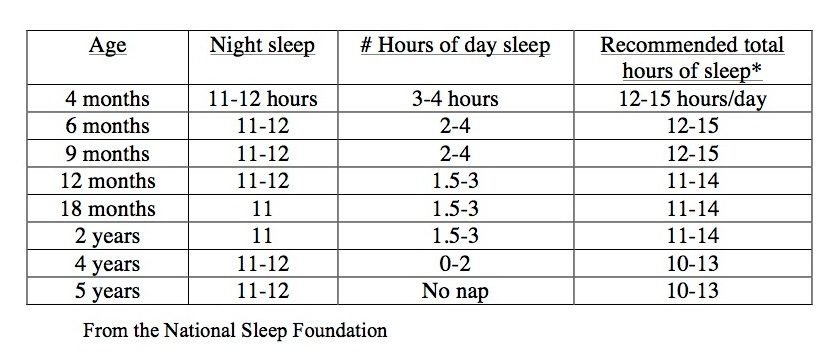Sleep regressions are very common with babies, especially the first two years of their lives. Primarily, your child was sleeping well for a while, and then all of a sudden their sleep starts falling apart. Most often, sleep regressions are caused by teething, travel, or when they get sick. Developmental milestones and leaps that your child will reach at certain ages will also cause them. They can last anywhere from a few days to a few weeks, which makes it even harder for those tired parents that were once sleeping well.
Below is a list of common sleep regressions by age:
3,6,9 weeks: Growth spurts During this time your newborn will be going through growth spurts, which lead to increase in hunger and fussiness, and in turn more wake ups at night. Their body is rapidly changing and adjusting those first few months, so the constant small feeds are sometimes necessary.
3 -4 months: “The 4-month regression” This regression is a big one for these little guys as they are going through a lot at this time. At about 3 months they go through another growth spurt, which can lead to more wake ups in hunger. They are starting to become more awake and alert at this time, which causes them to be more distractible. During this time they begin to reach their first milestone, which is rolling over. Some will do it sooner rather than later, and just practicing and trying to roll over can disrupt sleep. They will begin to roll one way and then get stuck and not be able to roll the other way. It’s suggested to do a lot of tummy time at this age to get them stronger and able to learn how to roll over both ways. Also, many parents at this age start seeing it harder and harder to get their child down to sleep. What used to work, no longer works. Some babies start breaking free from their swaddles, or the holding/rocking to sleep no longer soothes your baby. And finally, as they get closer to 4-5 months your baby will begin to secrete melatonin, which physiologically can cause some changes in their body as well.
6 months: At this age, there are quite a few reasons why your baby is going through a regression. First and foremost, they are going through another growth spurt. I know, many these first few months! Secondly, they are going through another developmental milestone that at this point is allowing them to begin to be more mobile. They have mastered the rolling over part, and now working on sitting up on their own, and perhaps beginning signs of crawling. When they go through a developmental milestone it can cause more wake ups as they are actually doing more light sleep (NON-REM) at night, rather than deep sleep (REM). For example, many parents will find their baby sitting up in the crib at 3:00 a.m. crying because they want to go back to sleep, but just don’t know how to lie back down. When they are trying to master the crawling, they will get on all fours and rock back and forth, which can a disruption in their sleep. And finally, they will go through their first separation anxiety peak. With more mobility and awareness, your child is trying to understand the world around her and how you still exist even though she doesn’t see you (object permanence). Where she used to go down easily at bedtime, now will cry for a few minutes as you leave the room because she is going through a separation anxiety peak.
8-10 months: “The 9-month regression” Just like in the previous regression, your little one is going through her (last) growth spurt at 9 months. She is also going through another developmental leap of learning how to pull herself up, so now when you go to get her out of her crib, she may be already standing waiting for you. Pulling up and learning how to go from standing to sitting, and then laying down is a developmental leap that will definitely affect sleep. You want to practice a lot during the day. Have your little one hold onto the sofa or coffee table and play a game to teach her how to sit back down and stand back up. Make sure not to get into the habit of helping her too much in the middle of the night.
12 months: With yet another milestone comes another separation anxiety peak. Around the age of 12 months, your little one will begin walking, which causes the most disruption in sleep. A lot of parents will see sleep begin to fall apart even before they are actually walking. Like any other milestone, make sure you practice a lot during the day and leave her be in the middle of the night. She may want to start practicing at night and do it on her own.
18 months: Around this age your child’s vocabulary will start increasing. Their receptive language (what she understands) is likely to be more advanced than her expressive language (what she can articulate), so make sure to constantly talk to her and explain to her what’s going on. She is entering toddlerhood, which can bring a need for boundaries and rules as she goes about learning how things evolve around her. Your toddler thrives on predictability (in everything) so make sure to stay consistent in your bedtime and middle of the night responses.
2 years old: As your toddler becomes more verbal and more aware of her surroundings she will go through a regression often linked to this as well as a separation anxiety peak. Often at this age, toddlers will also be potty-trained, which can through a loop for the night sleep. Just remember that potty training is only for the day, and not for night sleep. This will happen on their own, so don’t try to enforce night training.
So by now you may be asking yourself, how do I handle so many sleep regressions those first two years? Not to worry, not all kids experience a full regression at each of these stages, and some won’t even last that long. When you do realize your child is going through a sleep regression, fear not, it will subside. The most important part is to keep calm and respond consistently without creating new sleep crutches. You can always go in and check on your little one, but once you have determined that your child is OK and there’s not much you can do, it’s sometime best to leave them be. More practice during the day with those developmental milestones so that it is easier for them at night. If you find yourself needing more help through these regressions, contact me and we can set up a time to talk.




















